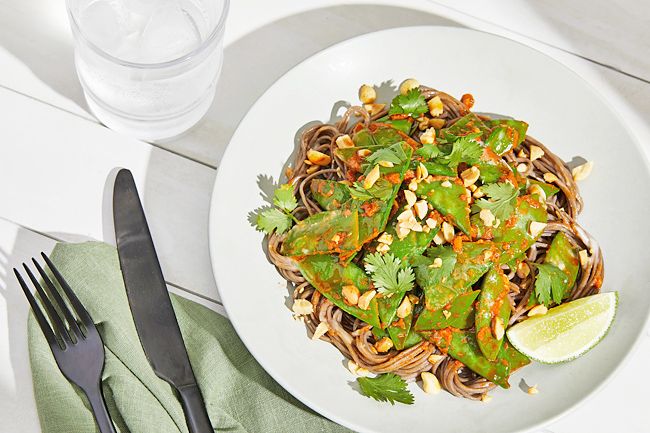Joe Yonan
THE WASHINGTON POST – Hetty Lui McKinnon wants to give you permission.
She wants to give you permission to escape what can feel like the tyranny – or as she more politely puts it, the luxury – of seasonality, the idea that you can’t or shouldn’t eat a strawberry in March or a tomato in December or butternut squash in June. “I mean, if you really want that and if that’s what’s available at your supermarket, it’s better than not eating a vegetable for three months because all that’s around are root vegetables and you’re sick of root vegetables,” she told me on a recent Zoom call from her Brooklyn home.
This liberating philosophy permeates McKinnon’s stunning new book, Tenderheart, which is a touching tribute to both her late father, a Chinese immigrant who worked at a wholesale produce market in Sydney when she was a girl, and also to the staple vegetables that she makes such an exciting part of weeknight cooking.
If you have the access (geographically and financially) to eat strictly according to the seasons, by all means do, but especially if your diet is primarily plant-based, McKinnon encourages you to loosen up. Seek out the best and freshest that you can, whether that’s at the farmers market or Walmart, but don’t feel obligated to pass up what looks good out of some purist sense of seasonal obligation. “The most important thing is to eat vegetables all year round,” she said.
In Tenderheart, McKinnon devotes a chapter apiece to her favourite workhorses – carrots, broccoli, celery, potatoes, greens and tomatoes among them – and takes a refreshingly egalitarian approach to each one. In the chapter intro about tomatoes, for instance, she writes about her summertime obsession by saying, “It is a tomato party and I’m the guest who stays too long.” But she also admits to still seeking out “the overgrown, tasteless tomatoes of my youth,” and finding “comfort in their underripe flesh and bulging cheeks”.

You’d think a peas chapter would be all about spring, but not when frozen peas are always at your disposal, and not when snow peas show up in supermarkets so many months out of the year. Those crunchy snow peas, she writes, are native to the Netherlands, not China, but they long ago became a staple in Cantonese and other Chinese cooking.
My favourite recipe of hers featuring snow peas demonstrates yet another way McKinnon wants to give home cooks more flexibility. While Tenderheart is a vegetable cookbook, she also describes her recipes as “pantry-led.” The combination – fresh produce given powerful injections of flavour from smart pantry ingredients – is the backbone of virtually all of her cooking, including her Thai curry snow pea stir-fry, which uses jarred Thai curry paste not as the base of a coconut milk stew, but as the punchy seasoning in a super-quick stir fry that you can serve as a side dish or with rice or noodles.
“A curry paste is really an everyday food,” McKinnon said. “It’s in every supermarket, it’s very easy to find and even the supermarket variety is really good.” Sure, you can go to the trouble to make your own, chopping lemongrass and makrut lime leaves and more. But with the supermarket version, “Someone’s done the hard work for you by concentrating flavor, adding all the aromatics and cooking it down for you. And really, when you have that, weeknight cooking is… well, that stir-fry is ready in just a few minutes, and the flavour is amazing.”
McKinnon makes her love of such pantry items clear in the Plant Powered II newsletter she wrote for us here at Voraciously, a 10-week series that includes 20 vegan recipes that make cooking and eating vegetables fun. One of the weeks is devoted to… the power of paste.





